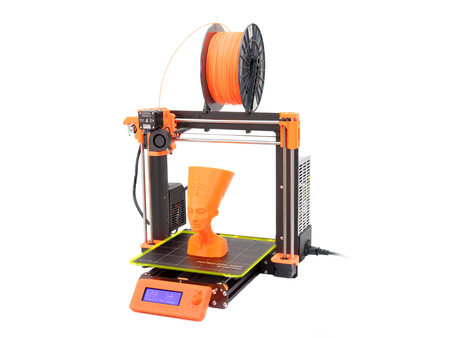Difference between revisions of "Prusa 3D Printer"
Dklinkner18 (talk | contribs) (→Terminology: added some more terms.) |
Jwhipple15 (talk | contribs) |
||
| Line 1: | Line 1: | ||
{{#set: | {{#set: | ||
|Is equipment=True | |Is equipment=True | ||
| − | |Is located in facility= | + | |Is located in facility=Prototype Lab |
|Is used in domain=Electronics | |Is used in domain=Electronics | ||
|Has icon=File:prusa_printer_icon.png | |Has icon=File:prusa_printer_icon.png | ||
Revision as of 08:49, 4 October 2018
The Prusa i3 MK3 is a 3D printer that includes a removable heatbed, filament sensor, and other unique features in order to rapidly prototype projects.
Documentation
Training
Terminology
Nozzle/Extruder
The nozzle (or extruder) is the part of a 3D printer which deposits the molten plastic filament onto the 3D printer bed. The extruder can reach 200°-300°C, depending on the filament used, but typically stays around 215°C for regular prints.
Heatbed
The heatbed is a 9.83" x 8.3" x 8.3" plate where the filament will be "printed" on. The bed heats up to around 60°C. Heated beds typically prevent the plastic from warping by keeping it warm. Warping is a common issue that happens on 3D printers, where the plastic of the print cools at an uneven rate, leaving the print wavy and not the way you intentioned.
Feeder
...
Fan
...
Stepper Motor
...
Filament
There are many different kinds of filament you can use on the 3D printer, ranging from PLA, ABS, TPU, and Nylon. The most common of these are PLA and ABS.
PLA stands for Polylactic Acid, it is the most common desktop 3D printing filament because it is odorless and very hard to warp on its own, therefore no need for a heated bed.
Sizing of Filament
...
CAD Modeling and Thingiverse
...
Slicing
Gcode
...
Usage
- starting a print
- loading filament
- things that can go wrong
- how to finish a print
